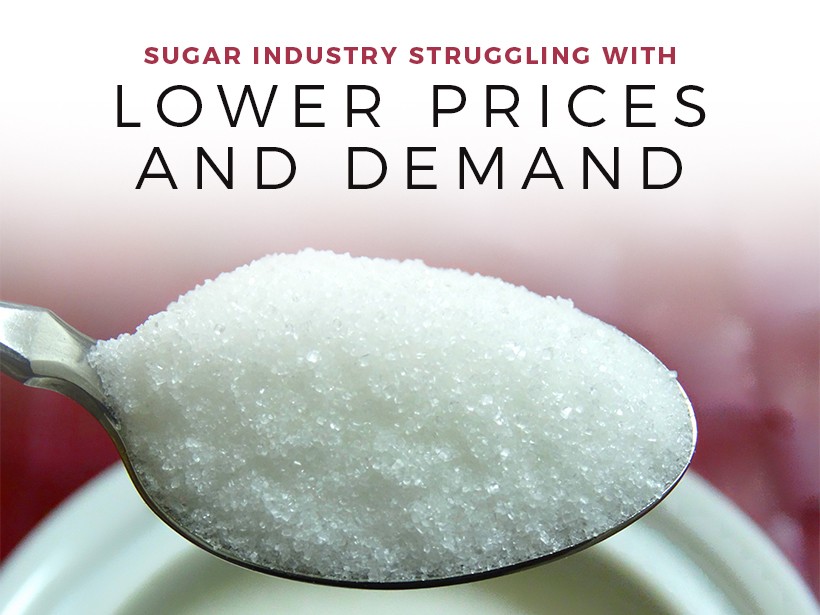The global sugar-producing industry finds itself in a precarious position as increased supply and decreased demand have resulted in plummeting sugar prices. As consumers in major markets are choosing healthier options, major sugar-producing countries are finding themselves with large amounts of sugar they cannot sell.
Why are sugar prices falling?
Reason #1: Global production of sugar is at a record high.
The law of supply and demand is quite simple: when the supply of an item outpaces demand, the value of that item drops.
Sugar supply is undoubtedly exploding. In May 2018, the USDA projected “near-record global production.”¹ In recent months, global production has exceeded even the USDA forecast. In July, the United Nations’ Food and Agriculture Organization (FAO) projected that world sugar production would set a new record this year.²
Even more concerning is a record gap between projected production and projected consumption. According to the FAO report, production is estimated to reach 187.6 million tons, but consumption is forecasted to be only 170.6 million tons, a difference of 17 million tons. This is anticipated to create “the largest production surplus in history.”³
With supply outpacing demand, sugar prices keep rolling down a hill.
Reason #2: Global demand for sugar has reached a plateau.
While the supply of sugar has exploded, consumption has only slightly increased in some countries and plateaued in other countries. In less-developed countries, the FAO expects demand to increase only slightly; in developed countries, consumption levels are expected to remain the same.
The FAO suggests that several factors drive demand: per capita income, population growth, and consumer preferences. Although the overall global economic outlook is good, the FAO emphasized that taxes on sugary beverages could decrease demand for sugar, although the exact impact is still uncertain.
What should we expect in the future?
No country feels the sting of sugar’s falling prices quite like India. Sugar producers in India find themselves in a difficult position: they have massive amounts of sugar cane, but the cost to produce it is less than the price of sugar. Producers are faced with two options: either accept the government’s minimum price on sugar or export it. The problem: neither option covers the cost of production.4
The Indian economy is, literally, reaping what it has sown. In order to support sugar farmers and win their votes, politicians propped up sugar prices. Naturally, the artificially high prices motivated farmers to produce more sugar than needed.5 Attempting to alleviate the producers’ plight with additional government subsidies would likely only worsen the problem. No clear way forward exists for the Indian economy.
The question is this: how much lower can sugar prices go? Some investors have begun investing in sugar, hopeful that the current rate of ten cents per pound is the bottom. Other analysts, however, project another 20 percent drop to eight cents per pound.6
Either way, the current situation of sugar producers’ is expected to get no sweeter in the near future.
NUTRITIONAL DISCLAIMER
The content on this website should not be taken as medical advice and you should ALWAYS consult with your doctor before starting any diet or exercise program. We provide nutritional data for our recipes as a courtesy to our readers. We use Total Keto Diet app software to calculate the nutrition and we remove fiber and sugar alcohols, like erythritol, from the total carbohydrate count to get to the net carb count, as they do not affect your blood glucose levels. You should independently calculate nutritional information on your own and not rely on our data. The website or content herein is not intended to cure, prevent, diagnose or treat any disease. This website shall not be liable for adverse reactions or any other outcome resulting from the use of recipes or recommendations on the Website or actions you take as a result. Any action you take is strictly at your own risk.
- Total Keto Diet Featured at DownloadAstro – App of the Day! - July 30, 2019
- Israel’s Yofix Launches Plant-Based Yogurt Alternative - March 4, 2019
- Glycemic Index Versus Glycemic Load: the Science Behind the Carbs - February 20, 2019




